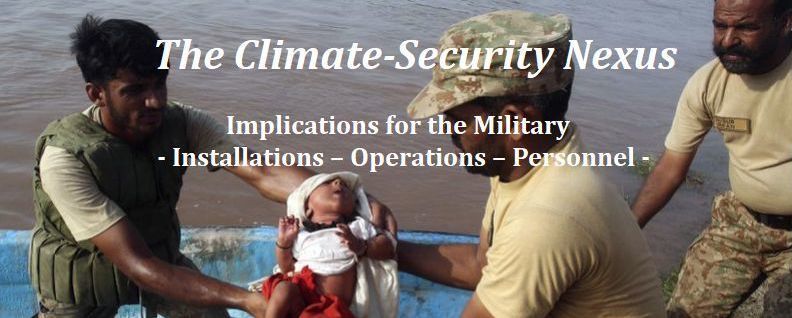The Climate-Security Nexus: Implications for the Military

24 October 2019 - European Economic and Social Committee, Brussels
Responding to the impact of a changing climate on international, regional, national, environmental and human security requires an all-of-society / all-of-government approach.
The conference used a multi-stakeholder, multi-level approach to help further raise awareness of the climate-security nexus and highlight the role of the defence community in assessing the risks to stability and peace, the role of civil-military cooperation in climate change mitigation and adaptation, and the role of state and non-state actors in addressing the implications of climate change for military personnel.
Climate change can affect the traditional work of military personnel in several ways:
- The very nature of the work might change (i.e. response to natural disasters, protection of critical infrastructure such as water and food supplies, etc.)
- The circumstances of the work might change (i.e. extreme heat, wider spreading of diseases, etc.)
- The nature of conflicts might change (i.e. more globalized, impact of human displacement and migration flows, conflict over land, water, and other resources, etc.)
- The equipment of soldiers might change (i.e. wearable devices producing and requiring energy, etc.)

The event brought together stakeholders form different institutions (EU, NATO, SHAPE, UN, OSCE, national departments of defence, foreign ministries and embassies, military trade unions and professional associations, academia, think tanks and NGOs to:
Raise awareness about the ways in which climate change impacts security challenges.
Exchange views of different stakeholders on what needs to be done to understand and address how the climate-security nexus effects military personnel:
- How does / will climate change affect the tasks carried out by military personnel?
- How do training and education need to be changed / adapted to prepare military personnel for these new tasks?
- Which roles can trade unions play to facilitate / drive the transition?
- Which investments need to be made to support the changes, provide the best equipment and protect personnel?
Develop ideas on how to further work on these issues in a coordinated way.
- PROGRAMME
- PRESENTATIONS:
From Awareness to Action: The French MoD Experience in Climate Security by Nicolas Regaud, Special Representative to the Indo-Pacific, Ministère des Armées, France
Climate Change and Security in the OSCE Context by Esra Buttanri, Senior Sustainable Development Adviser, Office of the Co-ordinator of OSCE Economic and Environmental Activities (OCEEA), Organization for Security and Co-operation in Europe (OSCE)
Rising Seas and Rising Risks by Major General ANM Muniruzzaman (Ret.), Chairman, Global Military Advisory Council on Climate Change (GMACCC) / President, Bangladesh Institute for Peace and Security Studies (BIPSS)
When Fragile States Face Climate Stress: Taking Action on Compound Climate-Fragility Risks by Ashley McIlvain Moran, Director, State Fragility Initiative, Robert Strauss Center for International Security and Law, University of Texas at Austin
Effects of the Changing Security Landscape for Military Installations, Operations and Personnel by Richard Brewin, International Capability Development & Sustainability Fellow, Ministry of Defence, UK / Former Project Officer, Energy & Environment Systems / Former Chair Energy and Environment Working Group, European Defence Agency (EDA)
Climate Change and Impact on Military Operations- Status quo, Integration of Scenarios and Operational Planning Processes by Lt. Colonel, Rene Heise, Atmosphere Physicist, Head of Section, Geo Support - Flight Systems, Air Operations Command - Geoinformation Center, German Air Force / Former Section Head, METOC SPOPS, Allied Command Operation, SHAPE
The Value of the Ecosystem Approach for Military Operations by Major Pieter Wit, (Ret.) Director/owner, Syzygy - consultancy on Conservation-cum-Development / Former Chair, IUCN Commission on Ecosystem Management and Former Member, IUCN Council / Member, Global Military Advisory Council on Climate Change
Challenges of Climate Change and Mitigation and Adaptation Policies for Trade Unions by Béla Galgóczi, Senior Researcher, European Trade Union Institute (ETUI)

The conference was organised by the Environment & Development Resource Centre (EDRC) and the European Organisation of Military Associations and Trade Unions (EUROMIL) in association with the Brussels Dialogue on Climate Diplomacy (BDCD) and the Global Military Advisory Council on Climate Change (GMACCC).
The conference was organised with the kind support of the European Economic and Social Committee and the Federal Department of Foreign Affairs (FDFA), Switzerland.
